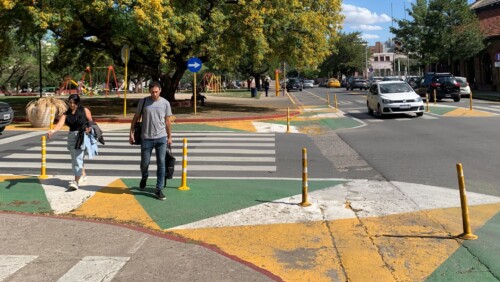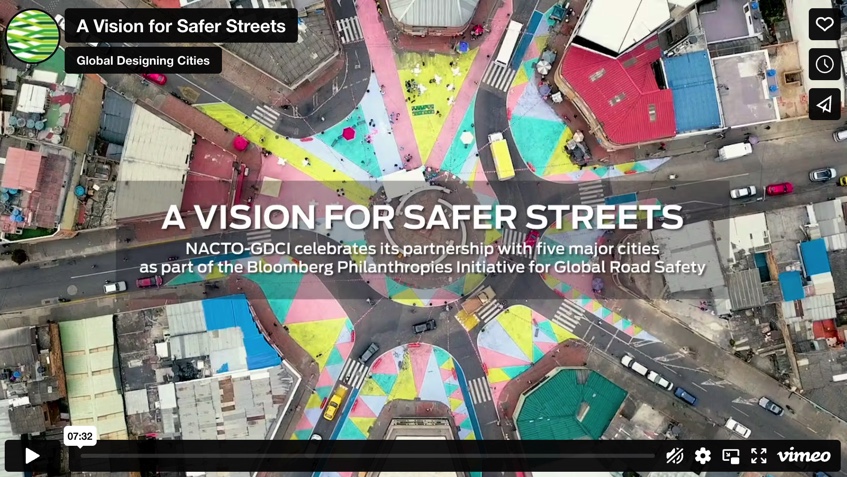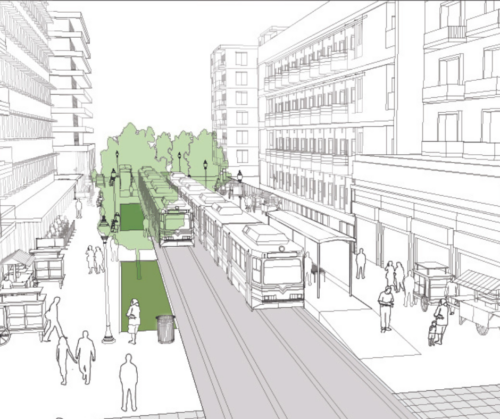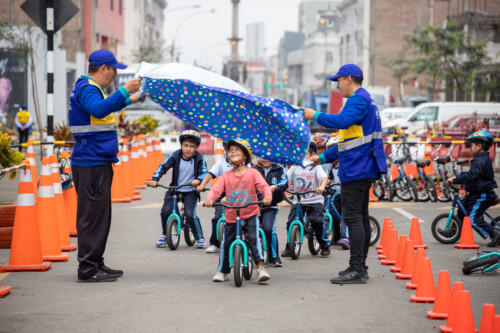Since 2016, as part of the Bloomberg Philanthropies Initiative for Global Road Safety (BIGRS), GDCI has collaborated with partners in five major cities around the world to design safer streets and mobility options, using the Global Street Design Guide as a blueprint for change.
In working to provide technical assistance—whether by providing design guidance to inform broad-based policy change, helping cities to implement and measure local street transformations, or conducting capacity building workshops and design reviews—we have witnessed measurable transformations, and we couldn’t be more proud to share the following video and announcement!
First, check out our new video, which celebrates the tremendous accomplishments of the BIGRS program and partners to date and highlights the impacts of these global efforts to improve road safety and street design in Addis Ababa, Bogotá, Fortaleza, Mumbai, and São Paulo.
Highlights
- Addis Ababa pioneered a new vision for the city’s streets through the Safe Intersection Program—which included projects such as Le Gare, Sebatana, and the Lebu Jemu Biking corridor.
- In Bogotá, city-wide programs like Plazoletas Bogotá and Vision Zero Zones radically changed neighborhoods, creating protected spaces for people to safely walk, play, shop, or socialize.
- Fortaleza implemented several low-cost, high-impact interventions, and became one of the few cities in the world to reduce its road traffic fatalities by half—meeting the goal set forth by the UN’s “Decade of Action for Road Safety.”
- Mumbai’s focus on reducing crash hotspots gave way to pop-up transformations at major intersections throughout the city, which demonstrated the value of reducing speeds and led to the monitoring of physical infrastructure projects.
- In São Paulo, close collaborations between road safety agencies and local grassroots organizations set the stage for multiple transformations, which together shaped almost 5,000 square meters of streets.
A Brief History of the Bloomberg Initiative for Global Road Safety
BIGRS works at the national level, to strengthen road safety legislation, the city level, to implement evidence-based road safety interventions, and at the regional level, to advocate for safer vehicles. The focus is on proven interventions such as:
The seeds of the BIGRS program were planted in 2007, when Bloomberg Philanthropies funded a pilot program in Cambodia, Mexico, and Vietnam to see if proven interventions could be adapted and used on a global scale. This effort was expanded in 2010 to support the implementation of these interventions and successfully reduce road traffic fatalities and injuries in ten low- and middle- countries that account for half of the global road crash fatalities: Brazil, Cambodia, China, Egypt, India, Kenya, Mexico, Russia, Turkey, and Vietnam.
Then, in 2015, Bloomberg Philanthropies launched Phase II of the Initiative for Global Road Safety to address issues of road traffic safety in ten cities (Accra, Addis Ababa, Bandung, Bangkok, Bogotá, Fortaleza, Ho Chi Minh City, Mumbai, São Paulo, and Shanghai), five countries (China, India, Philippines, Tanzania, and Thailand), and four vehicle market regions (Africa, Latin America, India, and Southeast Asia) with the primary goal of reducing road traffic fatalities and injuries.
Since that time, the initiative has saved an estimated 312,000 lives and prevented up to 11.5 million injuries.
Announcement: What’s Next for the BIGRS Program?
We are so proud of our partner cities for achieving these tremendous milestones throughout the first five years of our BIGRS partnership… but our work is just beginning!
Building on the program’s success, in February 2020, Bloomberg Philanthropies announced a plan to double its commitment to date, with an additional six-year, $240 million investment to support global road safety. Focusing on speed reduction, the 2020-2025 investment aims to double these impacts—to save 600,000 more lives and prevent up to 22 million injuries in low- and middle-income countries around the world.
As part of the new BIGRS phase, GDCI is thrilled to announce that we have begun working closely with eight global cities (including two continuing cities*) to build local capacity, assist with updating policies and design guidance, and support project implementations. These cities include: Recife and Salvador (Brazil), Bogotá* and Cali (Colombia), Guayaquil and Quito (Ecuador), and Delhi and Mumbai* (India).
Stay tuned for more details as we continue this important work in 2021 and beyond!





